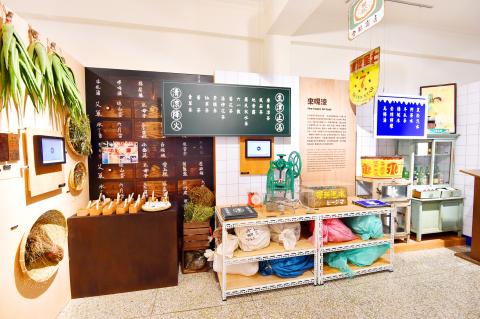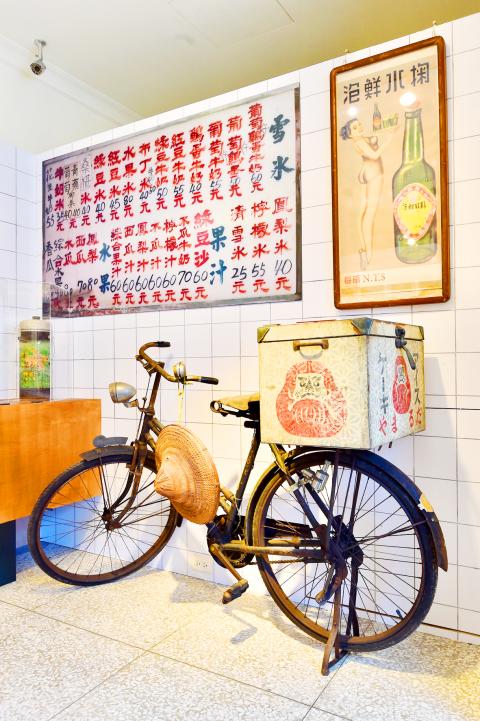Museum 207 (二0七博物館) has become one of the first private museums to receive an operation certificate under the Museum Act (博物館法), which founder and executive director Chen Kok-choo (陳國慈) hopes will help many private institutions to thrive.
The museum’s building, like those of many private institutions, has been designated a “historic building” by the Taipei City Government, Chen said, adding that the government should be commended for certifying private museums under the act.
“The act is a welcome change and crucial to the development of museums in Taiwan,” the Hong Konger said after accepting the paperwork that officially registered Museum 207 as a private museum in Taiwan.

Photo: Tu Chien-jung, Taipei Times
“This act lays out how the government will assist private museums,” she said. “Through the registration process, it will provide the resources that we need.”
The 2015 Museum Act promotes the development of public and private museums to improve people’s exposure to culture, history, science, nature, and the arts and humanities.
Museum 207, established in 2017, was the first in Taipei to apply for the official operation certificate, which gives it access to government funding and other resources.

Photo: Tu Chien-jung, Taipei Times
On June 27, 20 months after applying, the museum received the operation certificate and held an event on Monday to celebrate.
“I hope that in the future, private museums, especially those converted from old houses, will benefit from the government’s assistance, from the design stage to the renovation and construction stage, so that everything is done right,” Chen said, adding that she hopes the government would also support private museums’ operations through the program.
Being registered under the act gives the museum two main advantages: tax breaks and, more importantly, funding from either the central government or the city for exhibitions, museum head administrator Fiona Wu (吳佩郁) said.
Having just been registered, Museum 207 has yet to apply for funding, Wu said, but she estimated that the government might subsidize up to 70 percent of each exhibition.
The act makes subsidies more direct, unlike previously, when the central government would give the funds to local governments, which would then disperse the money among various community exhibitions — a “big circle” that could take a while, Wu said.
Article 7 of the Museum Act commits the government to providing professional advice, technical assistance, personnel training and financial grants to both public and private museums.
Chen said that private museums like hers are culturally important, because they hold events — such as Museum 207’s Taste of Summer exhibition — that help visitors relive the past and appreciate traditional values.
The exhibition, being held until Dec. 15, portrays how Taiwanese spent their summers when there was no air-conditioning, Chen said.
“The ice shops of the past were the predecessors of today’s Starbucks and coffee shops, but a major difference was that the ice houses were where the whole family would go — but would you go to Starbucks with your whole family?” she said. “So it also represents a social change in family relations, and we would like to take people back to that time so that they can cherish what has passed.”
At Monday’s event, Deputy Minister of Culture Kevin Peng (彭俊亨) praised Chen for getting Museum 207 registered under the Museum Act and for her commitment to promoting culture, such as founding the Taipei Story House, which curates exhibitions on Taipei history.
The Museum of World Religions in New Taipei City and the Wufeng Lin Family Mansion and Garden in Taichung are other private museums that have registered under the act, the ministry said.

A preclearance service to facilitate entry for people traveling to select airports in Japan would be available from Thursday next week to Feb. 25 at Taiwan Taoyuan International Airport, Taoyuan International Airport Corp (TIAC) said on Tuesday. The service was first made available to Taiwanese travelers throughout the winter vacation of 2024 and during the Lunar New Year holiday. In addition to flights to the Japanese cities of Hakodate, Asahikawa, Akita, Sendai, Niigata, Okayama, Takamatsu, Kumamoto and Kagoshima, the service would be available to travelers to Kobe and Oita. The service can be accessed by passengers of 15 flight routes operated by

Alain Robert, known as the "French Spider-Man," praised Alex Honnold as exceptionally well-prepared after the US climber completed a free solo ascent of Taipei 101 yesterday. Robert said Honnold's ascent of the 508m-tall skyscraper in just more than one-and-a-half hours without using safety ropes or equipment was a remarkable achievement. "This is my life," he said in an interview conducted in French, adding that he liked the feeling of being "on the edge of danger." The 63-year-old Frenchman climbed Taipei 101 using ropes in December 2004, taking about four hours to reach the top. On a one-to-10 scale of difficulty, Robert said Taipei 101

Taiwanese and US defense groups are collaborating to introduce deployable, semi-autonomous manufacturing systems for drones and components in a boost to the nation’s supply chain resilience. Taiwan’s G-Tech Optroelectronics Corp subsidiary GTOC and the US’ Aerkomm Inc on Friday announced an agreement with fellow US-based Firestorm Lab to adopt the latter’s xCell, a technology featuring 3D printers fitted in 6.1m container units. The systems enable aerial platforms and parts to be produced in high volumes from dispersed nodes capable of rapid redeployment, to minimize the risk of enemy strikes and to meet field requirements, they said. Firestorm chief technology officer Ian Muceus said

MORE FALL: An investigation into one of Xi’s key cronies, part of a broader ‘anti-corruption’ drive, indicates that he might have a deep distrust in the military, an expert said China’s latest military purge underscores systemic risks in its shift from collective leadership to sole rule under Chinese President Xi Jinping (習近平), and could disrupt its chain of command and military capabilities, a national security official said yesterday. If decisionmaking within the Chinese Communist Party has become “irrational” under one-man rule, the Taiwan Strait and the regional situation must be approached with extreme caution, given unforeseen risks, they added. The anonymous official made the remarks as China’s Central Military Commission Vice Chairman Zhang Youxia (張又俠) and Joint Staff Department Chief of Staff Liu Zhenli (劉振立) were reportedly being investigated for suspected “serious